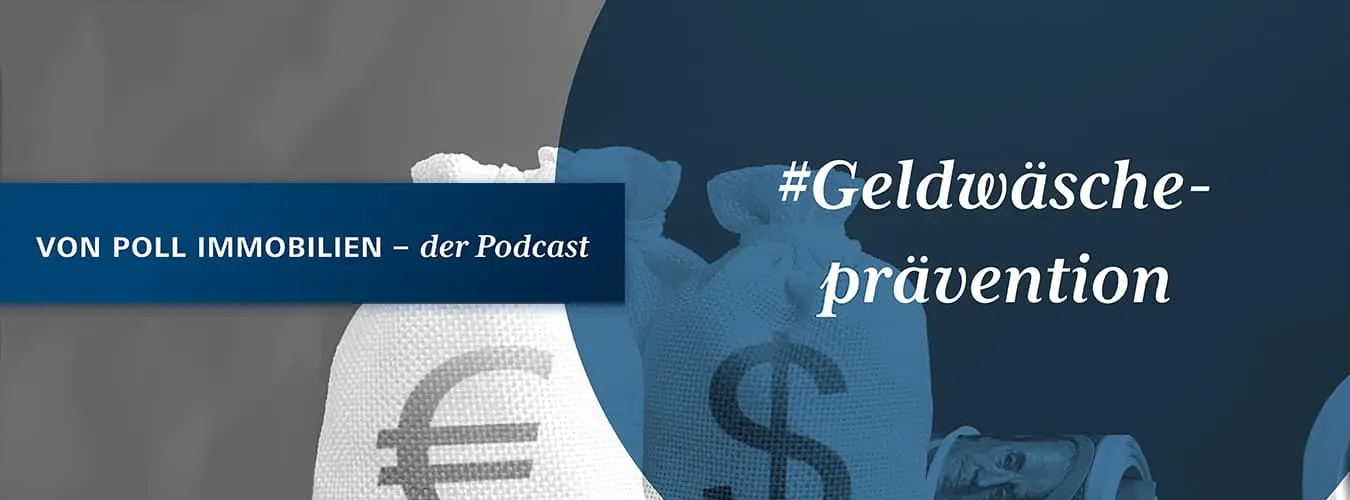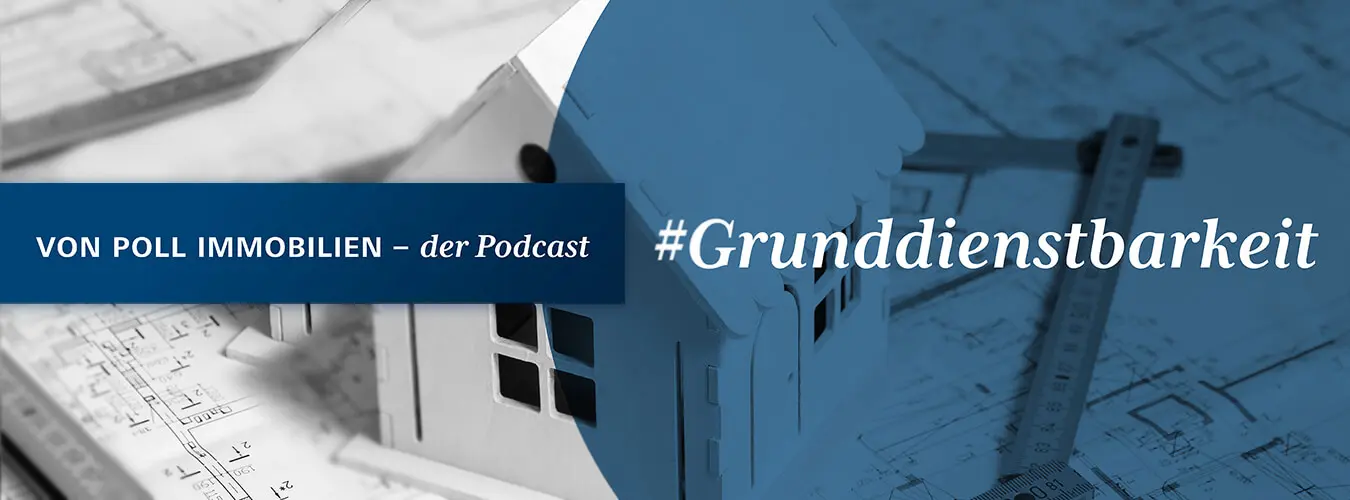In encyclopedia episode 6 of the VON POLL IMMOBILIEN podcast, Tommas Kaplan, Head of HR and Compliance and Money Laundering Officer at VON POLL IMMOBILIEN, and host Susanne Hauf conduct an exciting interview on the major topicMoney Laundering Prevention.
Money laundering and its prevention in daily real estate transactions: What are the challenges in money laundering prevention and how to behave in a suspicious case? Tommas Kaplan clarifies everything worth knowing about money laundering prevention. You can listen to the exciting conversation on these and other topics right here or read it as a transcript in the 'traditional manner'. We hope you enjoy it!
 Tommas Kaplan, VON POLL IMMOBILIEN:" Money launderers always have a competitive advantage, which the compliance department tries to minimize through its work. Anyone who earns and pays taxes on their money legally should not experience a disadvantage in the real estate market. "
Tommas Kaplan, VON POLL IMMOBILIEN:" Money launderers always have a competitive advantage, which the compliance department tries to minimize through its work. Anyone who earns and pays taxes on their money legally should not experience a disadvantage in the real estate market. "
Podcast episode 'Money Laundering Prevention' - complete transcript
Moderator Susanne Hauf:
For buyers and sellers of a property, the VON POLL IMMOBILIEN experts are contact persons and agents. But their task goes much further. As soon as a potential buyer expresses serious interest in a property, their very special duty of care kicks in to identify and prevent possible money laundering intentions at an early stage.
Money laundering and its prevention in everyday real estate transactions - that's what we want to enlighten you about in this episode. Our expert is Tommas Kaplan, Head of HR and Compliance and Money Laundering Officer at VON POLL IMMOBILIEN. He is also a former detective inspector.
Hello Mr. Kaplan.
Tommas Kaplan, Head of HR and Compliance and Money Laundering Officer VON POLL IMMOBILIEN:
Hello! I look forward to the conversation.
Susanne Hauf:
My name is Susanne Hauf. I am the host of the podcast. Welcome to the show!
Property is considered a stable value and safe investment. The rental housing market is very well developed compared to other countries and therefore naturally very attractive to capital investors, investors and, unfortunately, money launderers.
Mr. Kaplan, what is the challenge in preventing money laundering?
Tommas Kaplan:
Yes, money laundering prevention is a day-to-day practice for us with a high degree of responsibility. Also with the fact that the due diligence obligations to be fulfilled with the customer are basically only to be fulfilled when the customer expresses a serious interest in buying and thus the parties to the purchase contract - by this I mean the seller and the prospective buyer - are sufficiently determined.
This is so the temporal point where we would then have to start with the research. At that point, then the so-called KYC process has to start. That is the so-called 'know your customer process', as well as the due diligence, i.e. the risk assessment of the customer. And based on that, the decision is made whether to apply normal or enhanced due diligence. Meaning, is the customer green as in the traffic light model, orange or is he red. If it's red, that would definitely mean we have to apply enhanced due diligence. That means simply asking more questions, where does the money come from? How is the money going to be used? And so on. And through this approach, conspicuities with regard to money laundering should then also be identified in good time, in order to identify suspected cases of money laundering and terrorist financing as early as possible.
In more complex circumstances, such as the involvement of foreign companies and other parties in the transaction, it is necessary to take a more criminalistic approach in order to assess whether or not a SAR should be filed.
Susanne Hauf:
How do you react in case of suspicion?
Tommas Kaplan:
Yes, so in that case the SAR has to be filed. This in turn means that the mediated legal transaction, that is, the real estate transaction, may not be continued for the time being, respectively, this must be stopped. However, this must not be told to the customer.
Why? The so-called tipping off applies. This in turn means that if after 72 hours the FIU, that is this Financial Intelligence Unit, which is the special authority of the customs, the public prosecutor's office or the investigating authorities do not report, the business can continue, provided, however, that there is no concrete suspicion of money laundering.
Susanne Hauf:
The real estate sector is fundamentally attractive for capital investors, a circumstance that attracts money launderers. But that's not the only reason.
Tommas Kaplan:
Yes, that's right. What makes the fact in the real estate sector even more favorable are the numerous legal structuring options for domestic and foreign companies to disguise the origin of the funds and the beneficial owner.
This means that one problem in Germany is also that these legal entities, just like the beneficial owners, so by beneficial owner I mean the actual beneficiary of this, can be disguised through clever corporate nesting and through golden visa programs in, for example, Eastern European countries. In money laundering prevention practice, this poses a particular challenge, especially because you then don't know in the end where the customer actually comes from, through these Golden Visa programs.
Golden Visa Programs means the customer buys a citizenship in a European country, a European citizenship, and thus tries to bring his money from abroad, i.e. non-European country, to Europe
Susanne Hauf:
Could you please explain this with a case study from your practice?
Tommas Kaplan:
Yes, very much so. We had a client who came from a Eurasian region and who had acquired a Czech citizenship through a Golden Visa program. And through this he wanted to invest the funds for his real estate business via Czech Republic, Cyprus, Switzerland, from Switzerland to Germany. In this particular case, there were six companies in between. Two companies in Germany, as far as I know, three companies in the Czech Republic, one in Malta, in Cyprus and one in Zurich.
The problem in such situations is to identify the beneficial owner. But what we have succeeded in doing, it has to be said, is thanks to my compliance team at VON POLL, which of course, through my experience as a former detective superintendent, as well as my two colleagues, who are also two former commissioners, we are of course very well trained in this.
However, I have to point out that not every classic real estate agent has the same resources as at VON POLL IMMOBILIEN. Especially the implementation of an adequate risk management is a big challenge for small real estate agents. They simply lack the technical expertise that can only be built up through targeted training from professional providers.
Susanne Hauf:
Is the real estate sector at particular risk?
Tommas Kaplan:
That is a very good question. Basically, from my point of view, the real estate industry is not a high-risk sector. But it becomes problematic because of the legal situation in Germany. For example, there is no centrally kept land register in which the beneficial owners are entered.
Furthermore, there is currently no cash cap. This means a property can be fully and legitimately paid for with cash. While this is merely circumstantial, it does not necessarily mean that the person is actually laundering money.
Susanne Hauf:
And how do you then react specifically?
Tommas Kaplan:
As soon as VON POLL IMMOBILIEN suspects that something is not proceeding in accordance with the regulations, i.e. that incriminated funds are probably involved, we basically refrain from further cooperation and submit a SAR.
Money launderers always have a competitive advantage, which the compliance department tries to minimize through its work. Everyone who earns and pays taxes on their money legally should not experience any disadvantage in the real estate market.
Susanne Hauf:
Tommas Kaplan, Head of HR and Compliance and Money Laundering Officer at VON POLL IMMOBILIEN. Thank you very much for the exciting insights and helpful information.
Tommas Kaplan:
Thank you very much for the interview.
Susanne Hauf:
If there is a suspicion of money laundering, real estate agents are obliged to report this to the relevant authorities. In principle, the real estate industry is not a high-risk sector for money laundering. Problematic for real estate transactions are the numerous structuring options for legal entities, no cash ceiling and the fact that legal and incriminated funds can be easily mixed and thus contaminated.
Have questions about this or other topics? Feel free to contact our experts or find even more info on our website and in the VON POLL IMMOBILIEN app. The links can be found in the show notes of our podcast.
VON POLL IMMOBILIEN - the podcast: you can find us on Spotify, Apple Podcast, Google Podcast or in the VON POLL IMMOBILIEN app and on Amazon Music or via Alexa. Just tell Alexa, play the VON POLL IMMOBILIEN podcast.
Contact us anytime via our contact form or by telephone via +49 69 26 91 57-0 - or simply look around directly in our property search for properties in your area.




























































